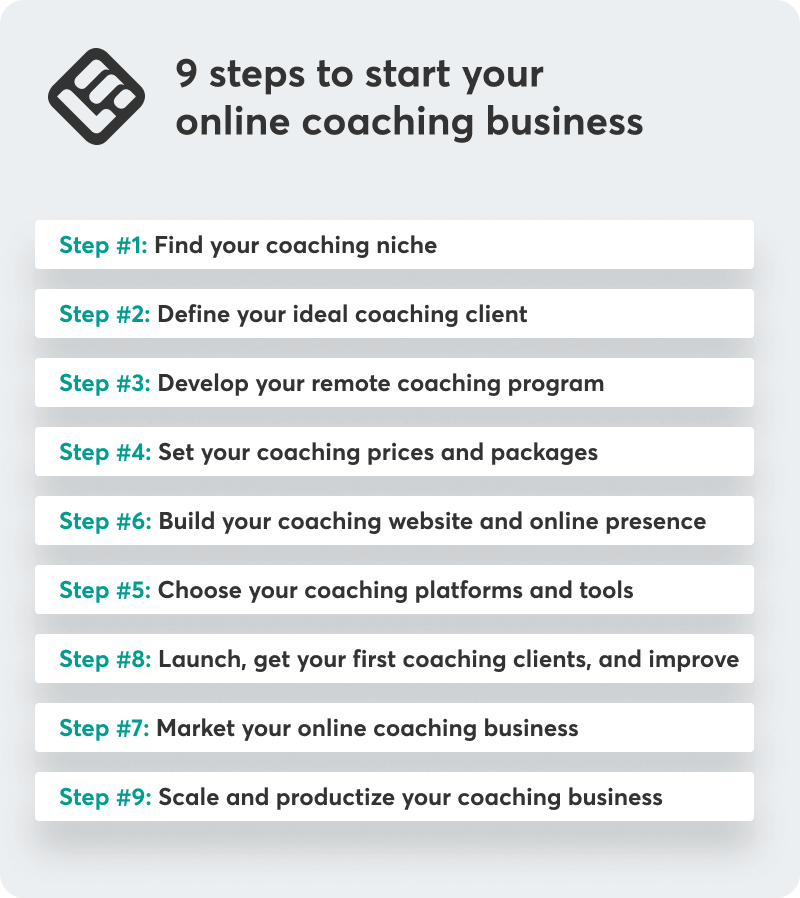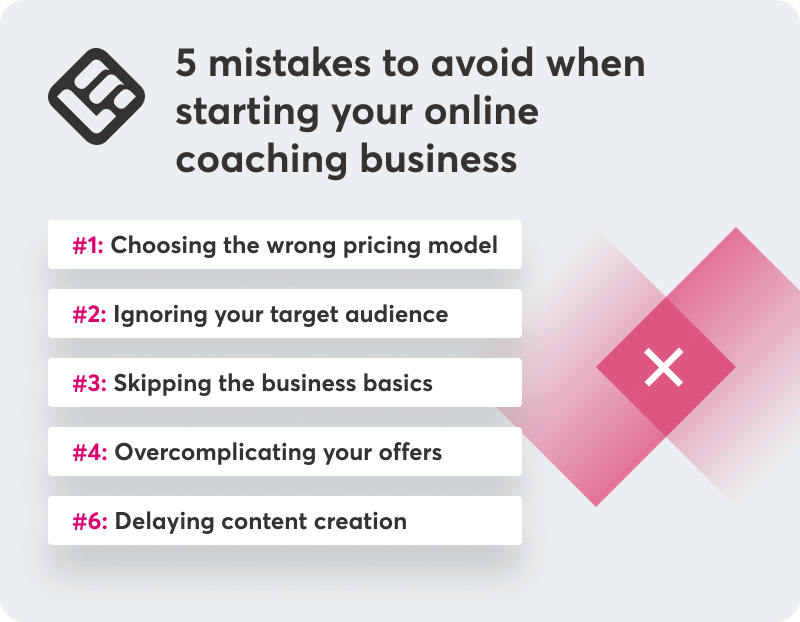Table of Contents
When I started with online coaching in marketing, I had a website.
What followed was (what I thought were) the bare essentials: a Zoom account, Calendly, and a few free social media profiles. The simplicity allowed me to focus on the heart of coaching: relating to people, nurturing their growth, and getting the message right.
As I grew my client list and learned more about their needs, I realized people wanted more.
Then, I saw the true power of building an engaged community and diversifying what I offered beyond one-on-one calls.
When you bring in all-in-one coaching platforms, group programs, and community-building features, you’ll watch your audience grow by leaps and bounds.
But building an online coaching business doesn’t have to be perfect on day one. I’ll walk you through every single step you need to get better at creating relationships, showing your expertise, and changing people’s lives through online coaching.
What is an online coaching business?
An online coaching business is a business (service-based type) that allows you to meet with your clients to offer them guidance, support, and mentorship, which often takes place via an online coaching platform. Everything happens through video calls, emails, online messaging, or within special online communities like Slack or custom-built groups.
What does an online coach do?
An online coach comes in to help people with specific personal or professional goals by giving them a clear action plan and regular support.
Depending on the niche, an online coach might help clients transition careers, lead them on health and wellness journeys, develop their businesses, acquire new skills, or pursue personal growth. Typically, they use one-on-one sessions, group video calls, or pre-recorded course content for this.
Online coaches will then consider adding extra learning opportunities to add value and create a sense of community among clients. Once their business is flourishing, they can try to offer group programs, self-study courses, or membership communities to earn more money and reach more people.
Types of online coaching
An online coaching business is incredibly flexible. Here are some examples that will help you reach different clients in distinct niches:
Why start an online coaching business?
When I think back to why I decided to start an online coaching business in the first place, it was for more freedom and impact. I knew I wanted to help people, but also have the freedom and flexibility to work my way.
Some of the pros I’ve identified for starting your own online coaching business include:
What makes a successful coaching business online?
Here’s how I see success. It’s all about how you share your knowledge so people can apply it to their lives, plus how you can build authentic connections.
For starters, when you choose a specialized niche/audience, you’ll already be on your way to providing a service to stand out with different sets of clients. But it’s also about focusing more on helping clients make progress toward tangible results, rather than simply providing information.
You’ll want to consistently share useful content on your website, email, or social channels to build trust and show expertise. Also, consider investing in lifelong learning, certifications, and building specific coaching competencies.
Don’t forget about the technicals. Using secure scheduling, payment, client management, and session delivery tools will save you time and help you impress clients. Track it all at the end so you’ll be building programs based on outcomes with measurable checkpoints and monitoring participants to lead them through change.
How to start a coaching business online in 9 steps
A successful online coaching business is built in the following way.

1. Pick a coaching niche
First of all, you’ll only be successful if you’ve got yourself a niche that combines your skill set, personal experiences, and passion with the market’s demand. Focusing on a particular niche positions you as an expert and helps you stand out.

But a niche isn’t just about narrowing your potential audience. It’s time to go deep rather than wide and think about what your greatest strengths are, what makes you more memorable, and what can help you stand out in your field.
2. Define who your ideal coaching client is
To thrive as an online coach, you need to know exactly who you want to work with. Get clear on who your ideal coaching client is by understanding your ideal client demographics, the problems they have, and even where they hang out online (for targeting purposes).
Begin by asking:
3. Develop your remote coaching program
Consider what type of program you’d like to deliver: one-on-one calls, in-person meetups (yes, you can pair them with online coaching too), or self-paced digital content.
The challenge for a successful remote coaching program is to allow ease of access to learning while still keeping learners accountable for the outcomes. While you’re planning your content and sessions, you might want to create a coaching program template to guide you as you expand your tech session base.
💡Keep learning: How to build a coaching program
4. Set your coaching prices and packages
Below is a comparison of the most common coaching pricing models, including descriptions, who they’re best for, and the primary pros and cons.
5. Choose your coaching platforms and tools
Don’t tell anyone, but at the beginning, I was cobbling together video calling, scheduling, and payment tools for free. When I realized I’d be better of with an all-in-one content platform, I was able to do it all in one place: booking sessions, accepting payments, automating back-and-forth communication with clients, and delivering course content. Plenty of time saved here.
💡Check out the best online coaching platforms for 2025 and choose the one that works best with your coaching style and long-term goals.
6. Build your coaching website and online presence
Your coaching website should establish your authority and showcase your unique value, while also leading potential clients into taking a specific action, such as scheduling a discovery call or committing to a program.
Beyond just design and positioning, your site should be a reflection of your personal brand along with a few must-haves: an “About” page to share your story, a services page to detail your offers, testimonials for proof, and a contact or booking system.
7. Market your online coaching business
There are thousands of digital marketing tactics you can try, but you absolutely don’t have to do it all from the start. I’m a marketer, and I’m still gradually rolling out and trying new campaigns.
You’ll first want to launch a newsletter, blog content, and maybe even try out referral outreach. The secret is to go where your audience already is and deliver high-quality, helpful advice that solves their problems.
8. Launch, get your first coaching clients, and improve
Begin by telling your network about your new gig and offering free or discounted sessions to people who’ve already reached out to you in the past.
This early stuff is gold: You’ll get valuable testimonials, real-world experience, and find out what‘s working (or not) before your big launch.
9. Scale and productize your coaching business
By “scale,” I mean: grow beyond one-on-one sessions. Online courses, memberships, or workshops transform your skills into products clients can access at their convenience, giving you more than just the hourly fee.
For a successful online business, start with whatever you enjoy doing the most. I love sharing new findings, so I opted to launch a YouTube channel and create my marketing courses for beginners. This helped me get in front of more people and also share all of the crazy, unique ideas I had.
💡Keep learning: How to grow your online coaching business
5 mistakes to avoid when starting an online coaching business
Here are the biggest missteps and how to avoid them so that your coaching business remains on track.

1. Choosing the wrong pricing model
Most new coaches undercharge, struggle to get their pricing right, or choose models that don’t resonate with their target market. The result? It’ll all be frustrating.
Don’t set your prices by the hour and limit packages that don’t produce specific results. Study the standard rates of the industry and decide on a pricing model that’s fair and, importantly, sustainable for you and your clients.
2. Ignoring your target audience
So many new coaches try to appeal to everyone and end up with generic services and marketing. That lack of clarity makes it difficult to get customers and create trust.
The novice coaches tend to believe that their worth lies in giving general support. They attempt to be all things to all people, career, attitude, productivity, business strategy. Such a broad brush normally brings nothing. That is the mistake I made when I started mentoring other founders. I did not narrow down and define a specific, outcome-based problem that I could address, and provided general knowledge instead.
Successful coaches, though, understand that speaking to well-defined audiences sets the foundation for programs that actually get results and stand out from the rest. With a deep understanding of your dream clients, the content, resources, and offers you develop to support them will truly speak to them.
3. Skipping the business basics
Never jump right into coaching without covering the legal, financial, or structural foundations of your business.
The temptation that most new coaches fall into is to appear to be on top of everything before they start the real job. I have witnessed coaches spend thousands of dollars on photoshoots, branding kits and funnels and they have not even delivered a single person through a full program. This type of pressure to be impressive upon arrival is a distraction to the real building blocks of trust which are honest results and word of mouth. A small number of case studies on actual clients will be much more valuable than a slick Instagram account.
Forgetting basics like having contracts, a system of remuneration, privacy policies, and business incorporation can lead to client distrust and even legal issues down the road.
4. Overcomplicating your offers
Take a second to ask yourself: Am I offering too many services or formats? This can daze clients.
Start out by creating one clear and results-oriented offer. This simplicity makes it easy to market, give great value, and collect powerful testimonials.
5. Delaying content creation
Content is the very first thing that drives visibility and credibility in the coaching world. Waiting for things to be “perfect” can halt your ability to share your knowledge and go after your goals.
Begin sharing valuable tips, case studies, or client wins early on to build trust, generate leads, and keep that client pipeline full.
Expert tips for starting an online coaching business
Next are a few of the tried-and-true secrets that have helped me (and other successful coaches) make a change, not just money.
Launch new products with a clear goal in mind
Every time I put something out there, I test it with a small group first. This lets me tweak the final offer using real feedback so I only publish or develop what truly resonates with them.
Set up automated sales funnels
I don’t do this too often as it’s enough to create a frictionless sales funnel whenever I make major changes and automate the email nurturing sequence.
Develop a no-frills referral flow
Referrals bring in new clients with an extra trust boost. Make it easy by approaching happy clients with special rewards or extra hand-holding for leads they bring in.
Build community from day one
I had a community before I started selling anything. Even if that’s just a private Facebook group, LinkedIn network, or a regular phone call, you’ll grow your personal brand and also create community-based programs to connect more people.
Invest in networking and partnerships
Here’s another vote for networking. Most of the coaches I talk to first grew their audience by joining webinars, talking on podcasts, or connecting with like-minded service providers.
Make the most out of the clients you already have
Create advanced courses, memberships, or special group calls for them.
LearnWorlds: Your all-in-one online coaching business platform
LearnWorlds is an ideal choice for launching a fully branded coaching center in minutes, running live sessions, and engaging your students with interactive videos, quizzes, and assessments.
Plus, strong marketing, analytics, and affiliate capabilities help you grow your audience so you’re not just teaching online. You’ll now have the power to create a successful, connected coaching community, all while generating substantial revenue from “product” sales.
Learn about LearnWorlds’ coaching offers today and start your free trial.

Alexandra Cote
Alexandra Cote is a SaaS growth marketer and online instructor who's worked with dozens of brands in the MarTech, HR tech, and productivity space. She's also a strong supporter of staying happy at work and choosing a healthy career path.
FAQ
Everything you have ever wondered, but were too afraid to ask...




